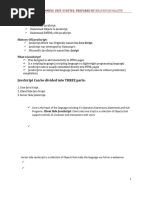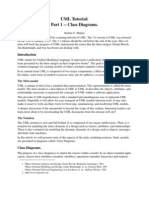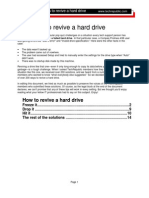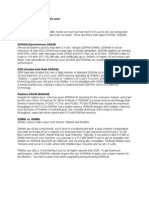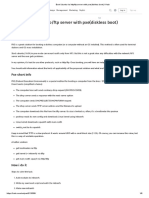Client-Side Web Scripting Lecture Notes
Uploaded by
danielle leighClient-Side Web Scripting Lecture Notes
Uploaded by
danielle leighClient-Side Web Scripting
• allows programs (i.e., scripts) to be downloaded from the web server
and executed on the client (i.e., browser)
• common client-side scripting technologies:
o JavaScript, ECMAScript, JScript
o VBScript, ActionScript
o Java applets, ActiveX controls, Flash animations
• common uses:
o dynamic (X)HTML
page embellishments and special visual “effects”, content
generation and manipulation, user interaction, document
and page navigation, etc.
o form validation
o asynchronous/partial content retrieval, RIA technologies (e.g.,
AJAX)
• common issues:
o browser support
no scripting support
scripting disabled
plugin availability
o version incompatibilities, non-standard implementations
o capability restrictions
scripting languages are not general-purpose programming
languages
e.g., JavaScript is restricted by the sandbox execution
model and the same origin policy
o security risks
browser implementation defects (e.g., buffer overflows)
e.g., for JavaScript, cross-site scripting (XSS) or cross-site
request forgery (XSRF) issues
malicious ActiveX controls
JavaScript
• developed by Brendan Eich at Netscape Communications as the
scripting language for the Netscape Navigator browser
• formerly called Mocha, then LiveScript, then JavaScript
• standardized by Ecma International as ECMAScript
• latest version: JavaScript 1.8
• common version: JavaScript 1.5, JScript 5.5, ECMAScript v3 (ECMA-
262 3rd edition)
• linked/embedded in web pages using the <script> element
o linked:
<script type=”text/javascript” src=”scripts.js” />
o embedded (either in the <head> or the <body> element):
<script type=”text/javascript”>
<!-- hide script from non-JavaScript browsers...
/* script code goes here... */
// end of script hiding... -->
</script>
• JavaScript + DOM/BOM + CSS + (X)HTML = DHTML
• basic language features:
o paradigm:
object-oriented (prototype-based), functional, imperative,
scripting language
o Java-/C-like syntax:
implicit semicolon insertion for statement termination
identifiers use alphanumeric, _, and $ characters
case-sensitive keywords and identifiers
single-line (//) or block (/* */) comments
o type system and variable scoping rules:
dynamic (a.k.a. loose or weak) typing
global (a.k.a. top-level) or local scopes
data types:
• primitive types
o numbers (decimal, hexadecimal notation)
o booleans (true, false)
o strings (single or double quote delimited)
o undefined and null
• composite (object) types
o core JavaScript objects
Object, Number, Boolean, String, Date,
Math, Global, RegExp, Error
arrays (Array)
functions (Function, Arguments)
o client-side JavaScript objects
Window, Navigator, Screen, Document,
Location, History
Anchor, Applet, Attr, Comment,
DOMException, DOMImplementation,
DocumentFragment, Element, Event, Form,
Image, Input, Layer, Link, Node, Option,
Select, Style, Text, TextArea
o keywords:
break, case, catch, continue, default, delete, do, else,
false, finally, for, function, if, in, instanceof, new,
null, return, switch, this, throw, true, try, typeof,
var, void, while, with
o reserved words (for possible future language extensions):
abstract, boolean, byte, char, class, const, debugger,
double, enum, export, extends, final, float, goto,
implements, import, int, interface, long, native,
package, private, protected, public, short, static,
super, synchronized, throws, transient, volatile
o operators
. [] () new
++ -- + - * / %
= compound assignment operators
== != < <= > >= === !==
&& || !
& | ^ ~ << >> >>>
?: ,
delete typeof instanceof in void
o statements and control structures
var
if-else
• condition expressions having values of 0, ””, null,
and undefined evaluate to false
switch-case-default-break
• allows any expression type as the switch expression
• can use expressions as case labels
• with fall-through functionality
while, do-while, for, for-in, break, continue
try-catch-finally, throw
• throw and catch can handle any expression type
function, return
with
You might also like
- Intelligent Document Processing (IDP) - Technology Vendor Landscape With Products PEAK Matrix™ Assessment 2019100% (1)Intelligent Document Processing (IDP) - Technology Vendor Landscape With Products PEAK Matrix™ Assessment 201978 pages
- ODI 12C Installation Step by Step PART 1No ratings yetODI 12C Installation Step by Step PART 14 pages
- Scripting Languages: by Md. Mahfuzur RahmanNo ratings yetScripting Languages: by Md. Mahfuzur Rahman36 pages
- Browser Scripting: Client-Server Architecture Client Side TechnologiesNo ratings yetBrowser Scripting: Client-Server Architecture Client Side Technologies9 pages
- Javascript, Jquery and Ajax: Lab. Bases de Dados E Aplicações Web Mieic, Feup 2014/15 Sérgio NunesNo ratings yetJavascript, Jquery and Ajax: Lab. Bases de Dados E Aplicações Web Mieic, Feup 2014/15 Sérgio Nunes74 pages
- (Ebook) Javascript.info Ebook Part 1 The JavaScript language by Ilya Kantor, javascript.info download pdf100% (11)(Ebook) Javascript.info Ebook Part 1 The JavaScript language by Ilya Kantor, javascript.info download pdf55 pages
- JavaScript. A Comprehensive manual for creating dynamic, responsive websites and applications: Suitable For Both Novice And Experts.From EverandJavaScript. A Comprehensive manual for creating dynamic, responsive websites and applications: Suitable For Both Novice And Experts.5/5 (1)
- JavaScript OOP Step by Step: A Practical Guide with ExamplesFrom EverandJavaScript OOP Step by Step: A Practical Guide with ExamplesNo ratings yet
- JavaScript Data Structures Explained: A Practical Guide with ExamplesFrom EverandJavaScript Data Structures Explained: A Practical Guide with ExamplesNo ratings yet
- (Ebook - PDF - UML) UML Tutorial - Class Diagrams100% (1)(Ebook - PDF - UML) UML Tutorial - Class Diagrams7 pages
- Boot Ubuntu Via HTTP - FTP Server With Pxe (Diskless Boot) - HabrNo ratings yetBoot Ubuntu Via HTTP - FTP Server With Pxe (Diskless Boot) - Habr6 pages
- BCA Project On Bus Reservation System - PDF Report With Source CodeNo ratings yetBCA Project On Bus Reservation System - PDF Report With Source Code109 pages
- How To Install Microsoft Hyper-V On HP ProLiant C-Class Server BladesNo ratings yetHow To Install Microsoft Hyper-V On HP ProLiant C-Class Server Blades24 pages
- Cloud Network and Security Services: Google Amazon AzureNo ratings yetCloud Network and Security Services: Google Amazon Azure27 pages
- A Guide To SIP Normalization On CUCM and Lua Scripting - Page 6 - Cisco CommunityNo ratings yetA Guide To SIP Normalization On CUCM and Lua Scripting - Page 6 - Cisco Community16 pages
- Display Subtotal and Total in ABAP ALV GridNo ratings yetDisplay Subtotal and Total in ABAP ALV Grid7 pages
- SITRAIN Training For: Automation and Industrial SolutionsNo ratings yetSITRAIN Training For: Automation and Industrial Solutions1 page
- Red - Hat - Satellite 6.5 Provisioning - Guide en USNo ratings yetRed - Hat - Satellite 6.5 Provisioning - Guide en US118 pages
- Fortigate Daily Security Report: Report Date: 2019-01-04 Data Range: Jan 03, 2019 (Pia-Fg900D)No ratings yetFortigate Daily Security Report: Report Date: 2019-01-04 Data Range: Jan 03, 2019 (Pia-Fg900D)13 pages
- GitHub - iptv-org_awesome-iptv_ A curated list of resources relaNo ratings yetGitHub - iptv-org_awesome-iptv_ A curated list of resources rela9 pages




























